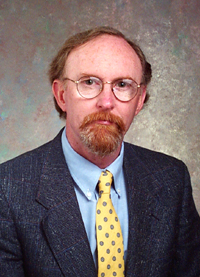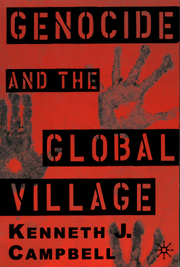|
 May 24, 2002--In his new book, “Genocide and the Global Village,” Kenneth J. Campbell, associate professor of political science and international relations at the University of Delaware, advocates the formation of “a standing U.N. military rapid reaction force” prepared at all times to intervene worldwide at the first signs of genocide. The author, a once active member of Vietnam Veterans Against the War, said that, after a lifetime spent studying appropriate uses of military force, this cause is just. May 24, 2002--In his new book, “Genocide and the Global Village,” Kenneth J. Campbell, associate professor of political science and international relations at the University of Delaware, advocates the formation of “a standing U.N. military rapid reaction force” prepared at all times to intervene worldwide at the first signs of genocide. The author, a once active member of Vietnam Veterans Against the War, said that, after a lifetime spent studying appropriate uses of military force, this cause is just.
“Certainly, there are some situations in which the use of military force is fundamentally clear—both legally and morally—and stopping genocide is one of those. Clearly, if there were ever an issue where one wanted to be on the side of the angels, this is one of them.”
Cited in a recent article in The Economist, Campbell’s 192-page book is published by Palgrave.
In the book’s forward Campbell writes, “As a young artillery forward observer with a marine ‘grunt’ company in Vietnam in 1968-69, I gained intimate knowledge of war, atrocities and the reality of quick, random and ugly death. This traumatic experience drove me to learn more about the legal, moral and political aspects of the proper–and at times improper–uses of military force. My near decade of research on the U.S military’s lessons of Vietnam…and the American military’s application of these lessons throughout the 1980s and 1990s eventually brought me to the problem of genocide. Why was there insufficient international political will be employ decisive military force to stop genocide in Bosnia, Rwanda and Kosovo? How can political will be built to suppress future genocide? What will the 21st century look like if we fail to halt genocide?”
Lest readers think genocide is a problem that lies only in the pages of history, the book includes frightening statistics to remind us that genocide is a very contemporary problem and one that has happened in the very recent past.
Campbell writes, “Between 1992 and 1995, more than 200,000 people were killed by ‘ethnic cleansing’ in Bosnia and several million more were made refugees. In Rwanda, during the spring of 1994, approximately 800,000 people were butchered in a ‘machete genocide’ that lasted just 10 short weeks–a rate of killing that was five times faster than the Nazis’ industrial methods during World War II. Yet, the international community failed to stop this genocide, and it remains in a quandary today over how to respond to this odious scourge to humanity.”
While Campbell admits that the “challenge posed to the international community by contemporary forms of genocide is a complex and difficult one,” his analysis of the problem focuses much on the United States, and he said that American leadership is crucial to resolving the problem.
“America alone,” he writes, “cannot stop every genocide in the world, but genocide will continue to go either unchecked or will finally be stopped after long, painful and costly delay, unless American plays a leading role in a global effort to prevent genocide.”
 Campbell recommends a “different, more pro-active approach” to stopping genocide that includes three components: 1) monitors that can detect the early warning signs of impending genocide, 2) military force ready to intervene and 3) a punishment component—a world court to prosecute perpetrators of genocide. For example, clear criteria need to be developed to distinguish between genocide and other lesser humanitarian emergencies, he said. Campbell recommends a “different, more pro-active approach” to stopping genocide that includes three components: 1) monitors that can detect the early warning signs of impending genocide, 2) military force ready to intervene and 3) a punishment component—a world court to prosecute perpetrators of genocide. For example, clear criteria need to be developed to distinguish between genocide and other lesser humanitarian emergencies, he said.
“Genocide has to be treated as the equivalent to a crime of aggression,” Campbell said. “Genocide is a classic act of aggression, only the target is people not the state. Right now it’s not viewed as seriously as it should be.”
Many times, Campbell said, the international community is reluctant to enter into a country’s internal conflict, referring to it as a civil war. He contends, however, “any time genocide occurs within a larger conflict it changes the conflict into the worst crime possible.”
Campbell said he wrote the book to make people aware of the fundamental nature of genocide in this post-Cold War era.
“Genocide and the Genocide Convention are falling through the cracks,” he said. “There is nobody to enforce and monitor this problem. In light of what we do to enforce other treaties, it would not be that difficult logistically to organize, and there is a crying need for it.”
Campbell, a member of the UD faculty since 1990, received his bachelor’s, master’s and doctoral degrees at Temple University. His academic areas of specialization are American foreign policy, international security, contemporary genocide and global governance.
|

